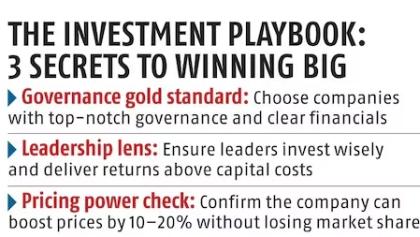'...you evaluate three key factors before committing your money.'
Read on for some valuable advice...

"We believe this is one of the most opportune environments for investing in high-quality largecaps in India over the past two decades," Saurabh Mukherjea, founder and chief investment officer of Marcellus Investment Managers, tells Sundar Sethuraman/Business Standard in Mumbai.
Within domestic equities, where do you see value?
The current market landscape is characterised by two distinct fault lines: Quality versus non-quality and smallcaps versus largecaps.
Low-quality stocks are as overpriced as they were in the year leading up to the Lehman crisis, while high-quality stocks are at their cheapest levels in 20 years.
Furthermore, smallcaps are trading at considerably richer valuations than largecaps.
Given these dynamics, we recommend investing in high-quality largecaps.
We believe this is one of the most opportune environments for investing in high-quality largecaps in India over the past two decades.
What have been your biggest hits and misses this year?
We successfully anticipated the agri theme by recognising early signs of rural distress in India.
As we gathered feedback from the ground, we predicted that policymakers would respond with supportive measures.
Consequently, we proactively built positions in companies like Eicher Motors and Godrej Agrovet, which benefited from the subsequent policy responses.
However, we underestimated the severity of China's economic downturn and its deepening structural crisis.
If we had foreseen this, we would have rebalanced our portfolio earlier by reducing exposure to specialty chemical companies heavily reliant on the Chinese market.

IMAGE: Saurabh Mukherjea
Photograph: Kind courtesy Marcellus
What is the typical feedback you get from your clients?
Marcellus faced a challenging period due to poor performance in 2022 and the first quarter of 2023, spanning 15 months.
During this time, clients naturally questioned our performance, wondering if our struggles were an anomaly in an otherwise stable market.
However, we have successfully recovered and regained momentum over the past year.
We are now seeing the initial signs of renewed inflows and growing interest from foreign investors.
In our domestic client base, we observe a shift in sentiment, with many seeking to reduce exposure to Indian equities, increase allocation to our global equities offering, and diversify into alternative asset classes, such as gold.
Is there any difference between how you approach the Indian and global markets, such as the US?
Our investment philosophy remains consistent across markets.
However, the American market offers a distinct advantage, mainly due to access to a relatively large number of high-quality, very liquid companies. This enables us to be more selective in our valuation assessments.
In contrast, India's midcap space poses a liquidity challenge, making it difficult to exit and re-enter high-quality stocks at reasonable prices.
As a result, the ease of portfolio rebalancing in the US is relatively significant.
Shed more light on your fund, which invests in overseas markets.
We observed a significant valuation disparity between American and Indian small and midcap stocks despite similar fundamental growth prospects.
For instance, American companies with 20 per cent earnings growth are trading at price-to-earnings (P/E) multiples of 20-25x, whereas Indian companies with similar growth profiles are valued at P/E multiples exceeding 30x, often surpassing 50x.
This anomaly caught our attention, especially given that India and the US have been the top-performing major stock markets over the past 10 and 20 years, with a remarkably low correlation between these two mega markets.
Recognising this opportunity, we launched our Global Compounders Portfolio two years ago to capitalise on high-quality companies with attractive valuations in North America and provide diversification in case of any adverse developments in India.
The fund has delivered impressive results, with net returns of 29 per cent in dollar terms (net of fees) and 30 per cent in rupee terms, compounded annually.

Every month, millions of new investors enter the stock market. What would be your advice to them?
If time is scarce, investors should consider investing through a mutual fund or portfolio management service rather than trying to create portfolios themselves.
In today's competitive and complex stock market, DIY investing can be an expensive and challenging hobby.
It's also difficult to build lasting wealth without expertise. If you still want to invest directly, ensure that you evaluate three key factors before committing your money.
Firstly, look for companies with high-quality governance and transparent accounts.
Secondly, examine the company's leadership and financial discipline. Assess whether the promoter invests capital wisely, generating returns that exceed the cost of capital.
Thirdly, focus on understanding whether the company has pricing power; determine if the company can maintain market share even if it raises prices by 10 to 20 per cent above competitors, indicating strong customer loyalty and pricing power.
By focusing on these essential factors, you'll be better equipped to make informed investment decisions and potentially achieve long-term financial success.
The Securities and Exchange Board of India's recent study showed trading costs eat considerably into profitability. Is there scope for a reduction in costs?
Despite being one of the world's top-performing stock markets over the past 20 years, India's market stock liquidity remains surprisingly low.
This lack of liquidity creates a large bid-ask spread, which increases trading costs and erodes returns.
In smallcap stocks, the spread can be as high as 60–80 basis points, resulting in substantial trading costs of up to 1.5 per cent for active fund managers like ourselves.
Furthermore, brokerage costs in the cash segment are also ripe for reduction as the market grows.
Currently, the combined costs of bid-ask spreads, brokerage, settlement, and taxes approach 1 per cent of trading value.
However, we expect these costs to decrease sizeably, potentially halving over the next five years, as market efficiency improves.
Disclaimer: Saurabh Mukherjea, his parents, and clients are invested in Marcellus' PMS offerings and all the stocks mentioned in the interview.
Disclaimer: This article is meant for information purposes only. This article and information do not constitute a distribution, an endorsement, an investment advice, an offer to buy or sell or the solicitation of an offer to buy or sell any securities/schemes or any other financial products/investment products mentioned in this article to influence the opinion or behaviour of the investors/recipients.
Any use of the information/any investment and investment related decisions of the investors/recipients are at their sole discretion and risk. Any advice herein is made on a general basis and does not take into account the specific investment objectives of the specific person or group of persons. Opinions expressed herein are subject to change without notice.
Feature Presentation: Rajesh Alva/Rediff.com












